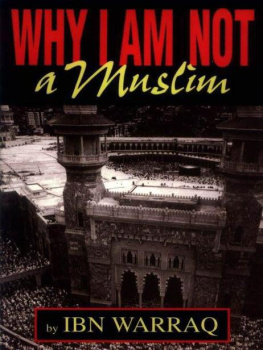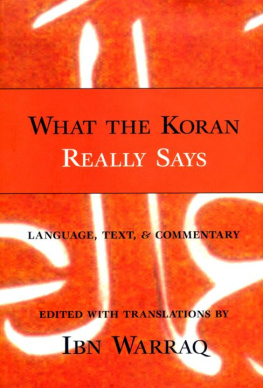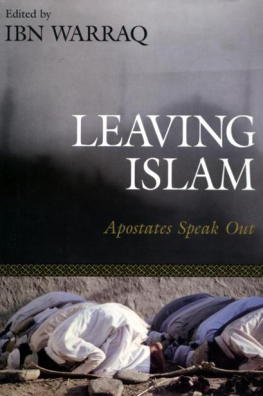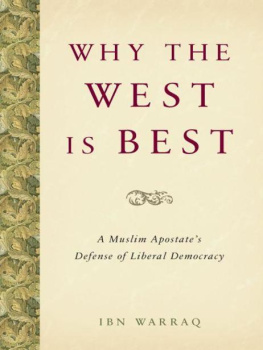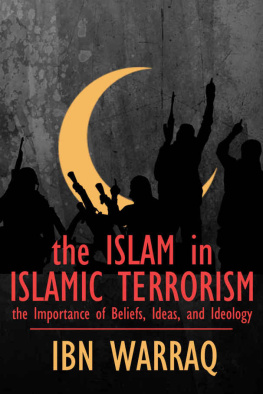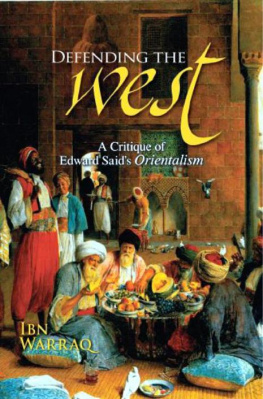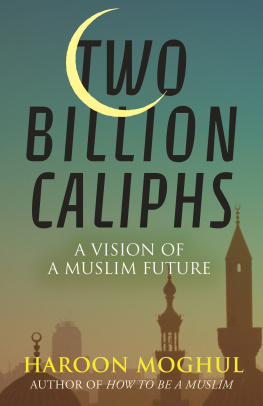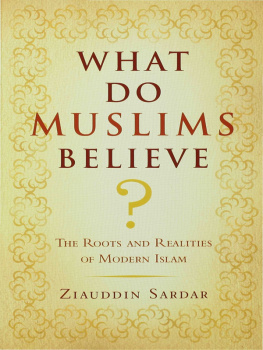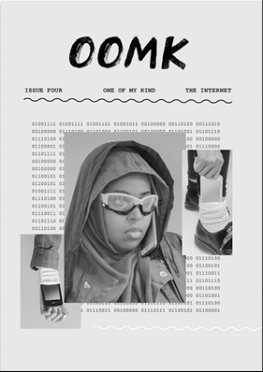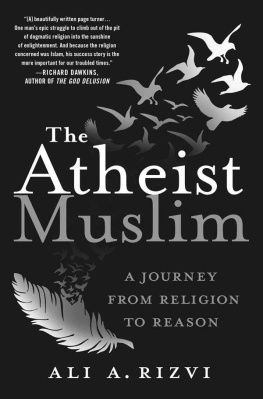Table of Contents
Muslims are the first victims of Islam. Many times I have observed in my travels in the Orient, that fanaticism comes from a small number of dangerous men who maintain the others in the practice of religion by terror. To liberate the Muslim from his religion is the best service that one can render him.
E. Renan
Published 2003 by Prometheus Books
Why I Am Not a Muslim. Copyright 1995 by Ibn Warraq. All rights reserved. No part of this publication may be reproduced, stored in a retrieval system, or transmitted in any form or by any means, digital, electronic, mechanical, photocopying, recording, or otherwise, or conveyed via the Internet or a Web site without prior written permission of the publisher, except in the case of brief quotations embodied in critical articles and reviews.
Inquiries should be addressed to
Prometheus Books
59 John Glenn Drive
Amherst, New York 14228-2197.
VOICE: 716-691-0133, ext. 207; FAX: 716-564-2711
WWW.PROMETHEUSBOOKS.COM
07 06 05 04 5 4 3 2
Hardcover published in 1995
Library of Congress Cataloging-in-Publication Data
Ibn Warraq.
Why I am not a Muslim / by Ibn Warraq.
p. cm.
Includes bibliographical references and index.
ISBN 0-87975-984-4 (hardcover : alk. paper)
ISBN 1-59102-011-5 (pbk. : alk. paper)
1. IslamControversial literature. I. Title.
BP169.I28 1995
297dc20 95-6342
CIP
Printed in the United States of America on acid-free paper
Dedication
To my mother, my wife, my sister, and my daughters, who came through despite religious fascism.
Foreword
R. Joseph Hoffmann
Westminster College, Oxford
Few books about religion deserve the attribution courageous. This book, I am pleased to report, does. It is courageous because it is (as the term originally denoted) full of heart (coeur) and courageous because it is an act of intellectual honesty and bravery, an act of faith rather than of faithlessness. It will undoubtedly be a controversial book because it deals personally and forthrightly with a subject widely misunderstood by theists and nontheists of various stripes. That subject is the Islamic faith.
New religions depend for their sustenance on the energy of converts. Thus Christianity in the first century of the common era and Islam in the sixth depended on the enthusiasm of the newly persuaded. Each had its prophet, each its network of zealous missionary-evangelists and later organization-minded hierarchs and caliphs to drive and sustain the structures that faith invented. Christianity and Islam (like rabbinic Judaism before them) arose as monotheistic reform movements with strong legalistic and dogmatic tendencies. Both idealized, if only the former idolized, the work, teaching, and revelations of their prophets in the form of sacred scripture. Both proclaimed the true God, the importance of charity toward the dispossessed, the quality of mercy. Yet both were inclined, as circumstances required and need dictated, to propagate their ideals and to enlarge the kingdom of God by force when persuasion failed. The dar-al-Islam and the kingdom of Christ, once called Christendom, were in many respects evolutionary twins for the better part of twelve centuries. The unlikely symbol of this relationship is the fraternal feud over proprietorship of the religious womb of the book religionsthe wars known as the Crusades. It is Jacobs legacy that his progeny would learn to hate each other and fight religious wars in the name of his God.
For all their likeness, the historical course of Christianity has differed remarkably from that of Islam since the late Middle Ages. The cliche that Islam somehow got intellectually stalled in the European feudal era overlooks too much that is undeniably rich, new, and momentous about the Arab mind, as a standard title describes the culture of Islam. Most Westerners who are not simply islamaphobes are willing to acknowledge where our system of numerical notation comes from; where algebra got started; how Aristotle was saved from puritan schoolmen in the Middle Ages; indeed, where scientific thinking in a number of disciplines originated. The culture of Islam, ranging in its missionary extent from Baghdad to Malaysia, is humanistically rich and potent. And yet. The Middle Eastern culture which spurred humanistic learning and scientific thinking remains a religious culture in a way that befuddles liberal Christians and secularists, and in a way that has not existed in the West since the decline and fall of Christendom in the Reformation. At least a part of our befuddlement stems from the fact that the Reformation is often seen by historians, not as a fall or a falling apart but as a rejuvenation of Christian culture. The persistence of misperceptions about what happened with the advent of humanistic thinking in the late Middle Ages stems from the view that the Christian reform was a back to basics movementan attempt to restore biblical teaching and practice to the church rather than (as it was at its roots) a radical challenge to systems of religious authority, a challenge that would eventually erode even the biblical pillars of authority upon which the Reformation itself was based. Islam underwent no such change and entertained no such challenge to Koranic teaching; its pillars remained strong while those of Christianity, unknown even to those who advocated the reform of the church in head and members, were crumbling.
To misunderstand the disjoining of Islam and Christianity as religious twins is, I would argue, the key to Western misunderstanding of the Islamic faith. The Christian reformation in the West (there was nothing remotely like it in the Eastern church, which, not coincidentally, provides a much closer analogy to Islamic conservatism) proceeded on the false assumption that knowlege of Scripture was ultimately compatible with human knowledgediscovery of the original meanings of texts, linguistic and philological study, historical investigation, and so on. Without tracing the way in which this assumption developed, the fragmented churches that exited the process of cultural, geographical, and denominational warfare between the sixteenth and the twentieth centuries proved the assumption false. Europe would never again be Christendom, and the New World would emerge as an archetype of the bifurcations, rivalries, and half-way compromises that the failure of religious authority had made necessary in the Old. By the end of the nineteenth century, liberal Christian scholarship, with its inherent historical skepticism, which did not spare even the divinity of the founder nor the sacredness of sacred scripture, was verdict enough on the marriage between humanistic learning and divine knowledge, as it was promoted energetically by the early Christian reformers. From the end of the eighteenth century to the present day, Christianity was a recipient religion, which found itself either at war with humanistic learning (as among the evangelicals from Paleys day onward) or, to use Bergers term, an accommodationist faith, whose role in the world seemed to be to accept the truths that culture provided and to express them, whenever possible, in a Christian idiom. Islam scarcely represented a fundamentalist reaction to contemporary culture, since the humanistic renaissance it sponsored was not implicitly a rejection of the structures of religious authority. Nor was the accommodationist option available to Muslims, since what constituted secular truth could not be equated with the prophetic truths of sacred scripture. Islam could only look at what Niebuhr once called the Christ and Culture debate with astonishment and as a debate that Christianity sooner or later must lose. To Western ears, Islamic talk of decadence seems offensive. In fact, it is an expression of the Islamic view that Christianity has lost the moral contest between secular culture and religious truth.


